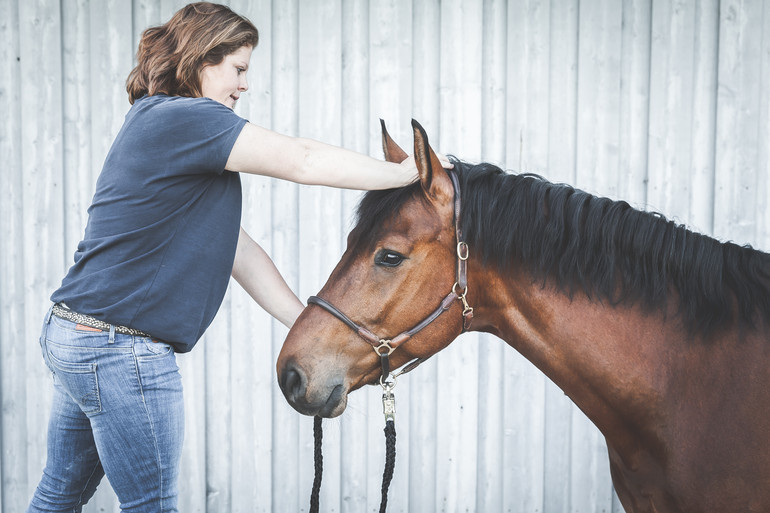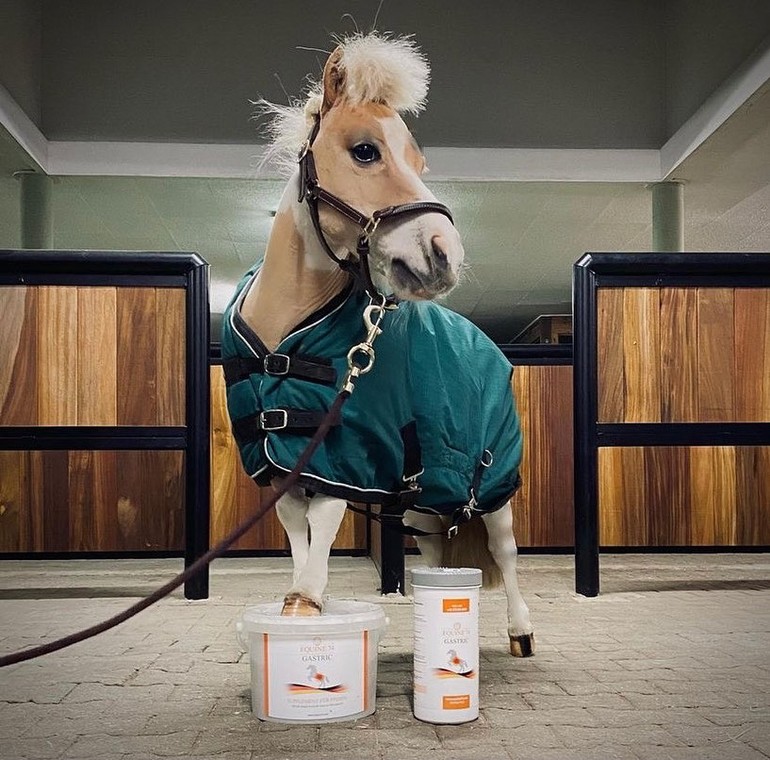Katharina Mang runs the equine rehabilitation centre in Oggelshausen, Germany. She is a practising veterinary surgeon and IAVC chiropractor (International Academy of Veterinary Chiropractic). In this interview with Equine 74, Dr. Mang shares her experiences with equine stomach ulcers, how they are related to colics, and their impact on stable management.
More attention must be paid to horses as individuals!
- Katharina Mang -
Equine 74: Is there a connection between stomach ulcers, gastritis, and colic?
“Yes, there is certainly a connection between EGUS (Equine gastric ulcer syndrome) and colic. Through my experience at the clinic it is often seen that colics from unknown causes, which are often quite severe and where a rectal examination initially may show nothing, are often triggered by cases of gastritis.”
“For these horses, we carried out a thorough examination followed by a gastroscopy and could see that these findings were really the trigger for this colic. When we do a house call for a case of colic, we rarely have an endoscope on hand, which is why I think the number of unreported cases of colic attributable to mucosal inflammation or stomach ulcers is high.”
Equine 74: Is this connection occurring more frequently now than in the past?
“I believe that cases of EGUS (Equine gastric ulcer Syndrome) are increasing. For one thing, because modern research and equipment allows us greater opportunities to diagnose Gastritis/EGUS, and because equine stomachs are getting more and more attention. And then there is the question of how our horses are being kept, fed, and exercised.”
"Often, it’s faulty management, trying to save money on forage, too many intervals between feeding, and lack of exercise that lead to problems. These are real stress factors for many horses. In my opinion, there are three areas that need to be considered: progress in medicine and technology, frequent mistakes in management or feeding, and the stress level of the individual horse.”
Equine 74 Gastric counteracts the effects of constant stress-related acid problems with high mineral acid buffering. Learn more.
Equine 74: What are the most common causes for equine stomach ulcers and mucosal inflammations, and do environmental factors like management play a role in their occurrence
“We have several issues to consider here: diet, stabling, stress, exercise, and physical/chemical causes. As it’s a complex issue, I think that all of these points are important. In diet, important factors are long intervals between meals, poor-quality or insufficient forage, and too much concentrate feed. Husbandry is where opinions differ, but you should really look at what works best for each individual horse. Stress can arise in all kinds of stables.”
“Long feed intervals cause the stomach to digest only intermittently and not continuously as horses were originally built to do. Making small amounts of feed available throughout the day is better than two big daily meals. Physical and chemical causes of course should also be considered. These include chewing difficulties, stomach parasites, cribbing, medications, etc. More attention must be paid to horses as individuals!”
Equine 74: What causes increased gastric acid production in horses?
“The glandular part of a horse’s stomach continually produces gastric acid, independent of feed intake and around the clock. Stress, especially, will increase acid production.”
Equine 74: What are the symptoms of gastric ulcers?
“Symptoms often vary greatly and can range from inability to gain weight, slight apathy, aggression, resistance to being ridden, or colic. From a chiropractic viewpoint, recurrent problems in the withers area can be an indication. Hypersensitivity in the girth and saddle areas or in the sternum may also be a sign.”
“I also ask, how is the horse generally? Horses that simply have a hard time bulking up or have a high belly towards the flank are mostly quite tense, which can also point to ulcers. I also look at their stable, their feed, and how they’re being kept.”
Equine 74 Gastric Make your horse feel happy inside! Natural Acidbuffer, optimized pH-level in horses stomach and gut that helps for better performance and satisfaction without compromise. Because good for your horse should also mean good for you! Order a free feed sample.
Equine 74: How do you diagnose gastric ulcers?
“This isn’t always so simple; the symptoms are important. Sometimes a blood test will reveal something, or a gastroscopy, but these are just snapshots. We mostly carry out a diagnostic therapy. If symptoms improve from the administering of specific medications, then ulcerations are the probable cause.”
Equine 74: What’s your experience with Equine 74 Gastric?
“It was recommended to me by a patient’s owner. It’s in pellet form, which makes it easy to feed to the horse. Powdered supplements are often problematic because horses don’t want to eat it. I also really like the pellets, as they allow you to test the product or feed it to your horse for a prolonged period.”
“I’ve had very good feedback. When I treat stomach problems, I begin with omeprazole, accompanied by Equine 74 Gastric. This works quite well, as there is no abrupt stop following the omeprazole treatment. However, it is also important that changes are made to the horses’ external situation, meaning their stable management.”
Equine 74: Which horses should be given Equine 74 Gastric?
“Equine 74 Gastric is suitable for a wide spectrum of horses. It’s especially helpful for horses that are susceptible to stress. When travelling to a show, or when skittery horses are under considerable stress, I reach for Equine 74 Gastric before a mucosal inflammation or ulcers have a chance to develop. However, you should still make changes to any other factors as best you can. Better earlier than later.”
Equine 74 Gastric counteracts the effects of constant stress-related acid problems with high mineral acid buffering. Learn more.
Equine 74: Will equine management change in the future?
“I think that equine management and feeding will undergo more changes, as it’s an important topic and will become even more important in the coming years.”










